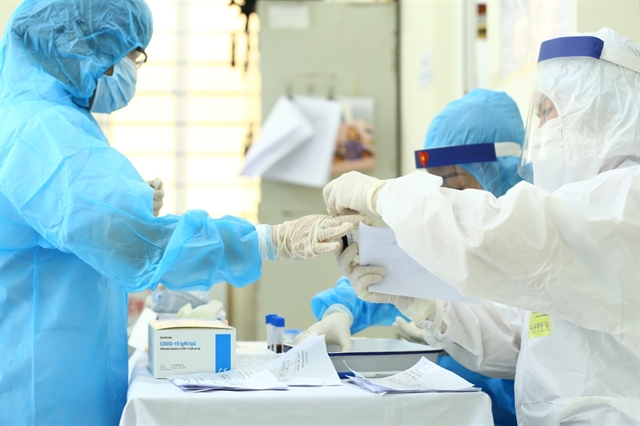 |
|
On August 1, health workers in Hanoi conducted rapid COVID-19 tests for those returning from the central city of Da Nang, which has become Vietnam's coronavirus hot spot.
|
The new strain of coronavirus that has caused the outbreak in central Vietnam might be a more infectious but not necessarily deadlier strain than seen before in the country, infectious disease experts have said.
The new outbreak has caused public concern after causing eight deaths in a week, Vietnam's first since the onset of the pandemic.
Nguyen Van Kính, former Director of the National Hospital for Tropical Diseases and chairman of Vietnamese Society of Infectious Disease, said the current strain of coronavirus in Vietnam’s outbreak is D614G, also the dominant mutation wreaking havoc across the globe.
Many studies have suggested the strain has made the virus more contagious, and while the results are not definitive, the consensus seems to be that it doesn’t make a patient sicker than other variants of SARS-CoV-2.
Nguyen Trung Cap, Deputy Director of the National Hospital of Tropical Diseases in Hanoi, said the outbreak in Da Nang had spread into three at-risks groups of patients – those with a long history of kidney failure, cancer patients and patients in intensive care.
“These are the groups of patients that even without the virus, their lives are already at grave risk. The contraction of SARS-CoV-2 can be considered 'the last straw', leading to abnormal deaths recently. But that doesn’t reflect the public health situation or the virulence of the virus,” Cap said.
Vietnam can expect more COVID-19 fatalities in the near future, as many of the patients are elderly and already suffering from multi-organ failures and weakened immune systems, according to Luong Ngoc Khue, head of Medical Services Administration under the health ministry.
The current R0, the reproduction number that represents the average number of people infected by one virus-carrier, is at 5-6, while previously it was just 1.8-2.2, according to experts.
World Health Organisation (WHO) representative in Vietnam Kidong Park earlier said the occurrence of new COVID-19 cases in Da Nang is not alarming, as the virulence of this strain is no different from that in other countries.
There has not been sufficient evidence that shows the virus has become more contagious or deadlier, he said.
Da Nang has reported six community infections that health authorities are unable to identify the original source of exposure, while the rate of those who have come into close contact with the initial confirmed case being infected has also become higher. — VNS